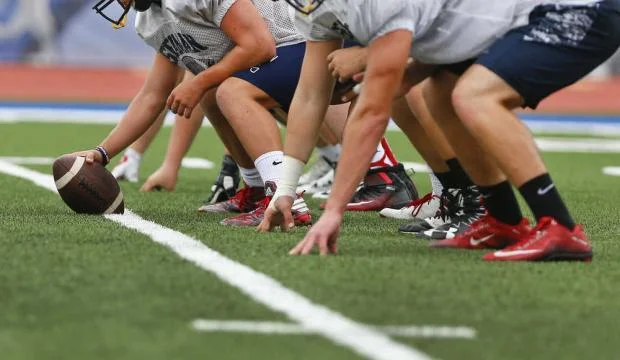Celia Llopis-Jepsen, The Topeka Capital Journal, September 10, 2016, Updated September 12, 2016
EXCERPTS FROM THE ARTICLE:
In Kansas and across the country, fields like Piper’s — which cost schools several hundred thousand dollars to install — have degraded earlier than expected.
The product woes have left school districts in a bind as they figure out their best options to replace troubled turf. And though the fields are warrantied, the districts are walking away with very different deals.
Some — like Seaman USD 345 and Geary USD 475 — are paying upward of $300,000, while others have struck much cheaper deals or received free-of-cost replacements. At least one district in Texas collected $275,000 from the manufacturer, FieldTurf, in a settlement in 2013.
At issue is a product sometimes called Duraspine. For several years, FieldTurf purchased the fiber for it from a third party that it eventually sued and blamed for field failures across North America. The parties settled mid-trial for an undisclosed amount.
Now FieldTurf faces legal challenges in multiple states, with some attorneys arguing the company is backing out of its warranties. Moreover, they accuse FieldTurf of knowing the material was flawed by 2009 or earlier yet continuing to install it.
Kansas and elsewhere:
The extent of the complaints about FieldTurf isn’t easy to determine. Some have sued in federal court, others in local courts. Still others haven’t sued at all, instead resolving the matter through negotiations.
The Capital-Journal found lawsuits in Kansas, Wisconsin, California, Texas and Tennessee. They claim breach of warranty, breach of contract, deceptive business practices and other wrongdoing. Additionally, news outlets have covered schools reporting FieldTurf troubles or receiving warranty replacements in New York, Ohio, Florida, Oregon, Georgia, Iowa and Oklahoma.
Duraspine warranties:
Pittsburg USD 250 installed Duraspine in 2006 and received a new field six years later, free of cost. Superintendent Destry Brown said the process wasn’t easy.
“We’d have kids come off the field and they’d be covered with green fiber,” he said. “It took us a long time to get them to agree to replace it. Well over a year. We had attorneys involved.”
'Significant' complaints:
In 2009, Bret Harte Union High School District in California installed an 88,900-square-foot soccer and football field for just less than $600,000.
Now it accuses FieldTurf of making contractual and marketing promises that were either known to be untrue or “recklessly disregarded” the risk that they were wrong.
It points to documents that FieldTurf filed in its own case against the third-party fiber supplier, a company called TenCate. Those documents reveal FieldTurf received “complaints from a significant number of customers” in 2009 and 2010 about the fibers breaking down. Bret Harte asserts FieldTurf was investigating Duraspine field failures as early as 2006.
“Incredibly, during the trial of the TenCate Action,” the school’s lawsuit argued, “FieldTurf’s CEO testified under oath that in a four-year period, FieldTurf spent $7.9 million to ‘investigate and pursue its claims.’ ”
“At the very same time” that FieldTurf sued TenCate, it continued, FieldTurf was “nevertheless, in the process of installing 41 new fields made with the defective fibers without telling its customers their fields would likely fail prematurely.”
To offer a local example, Auburn-Washburn USD 437 paid about $860,000 to install Duraspine in the summer of 2010 — well into the period in which FieldTurf argued in court that it was receiving significant complaints about the product. USD 437 is now experiencing problems with the field.
FieldTurf isn’t the only company schools have reported problems with. Last month, the Modesto Bee wrote about a California school frustrated with its MondoTurf field, which school officials told the newspaper should have lasted more than a decade but is unsuitable for play after just six, causing them to close it. Also last month, Texas’ KTXS reported on a school district suing a construction company that installed Sporturf, which the district said deteriorated prematurely.
Nor do all school districts feel they have had to push FieldTurf to address problems.

